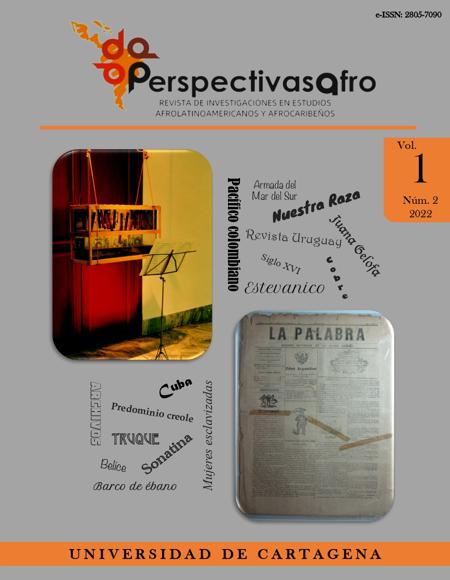Juana Gelofa Pelona: testigo esclavizada pero insubordinada en Santo Domingo (1549-1555)
Juana Gelofa Pelona: An Enslaved but Insubordinate Witness in Santo Domingo (1549-1555)
Contenido principal del artículo
Resumen
En 1549, Juana Gelofa Pelona, una mujer africana esclavizada, fue testigo en un juicio legal en la ciudad de Santo Domingo, de la isla La Española. Francisco Bravo fue acusado de asesinar a su esposa Catalina de Tinoco y presentó a Juana como testigo para que declarara a su favor. Ambos, Francisco y Catalina, habían sido dueños de Juana, y los familiares de Catalina, quienes habían tenido a Juana en su posesión por generaciones, le advirtieron que no declarara a favor de Francisco. Sin embargo, Juana testificó con convicción a pesar de ser amenazada y castigada severamente por sus nuevos dueños, los cuales resolvieron venderla a un nuevo esclavizador en otra ciudad y así prevenir su continuo desafío en la corte para con la familia de Catalina. Este artículo plantea que Juana orquestó su propia venta para “liberarse” de sus nuevos dueños. También se documentan ciertos aspectos sobre la vida cotidiana en el Santo Domingo del siglo dieciséis resaltando detalles compartidos por algunos de los testigos.
Palabras clave
Descargas
Datos de publicación
Perfil evaluadores/as N/D
Declaraciones de autoría
Indexado en
- Sociedad académica
- Universidad de Cartagena
- Editorial
- Universidad de Cartagena
Detalles del artículo
Referencias (VER)
Acosta Corniel, Lissette. “Towards a Theory About Spanish Women in Sixteenth Century Hispaniola: A Research Guide and Case Studies.” Dissertation N.P. State University of New York at Albany, 2013.
_____ “Elena: Running to Dance and Other Defects in Colonial Santo Domingo (1771-73). Women, Gender, and Families of Color, 9/2 (2021): 189–207. DOI: https://doi.org/10.5406/23260947.9.2.05
Bailey, Anne C. African Voices of the Atlantic Slave Trade: Beyond the Silence and the Shame. Kingston, Jamaica: Ian Randle, 2007.
Belmonte Postigo, José Luis. “Las dos caras de una misma moneda: Reformismo y esclavitud en Santo Domingo a fines del periodo colonial.” Revista de Indias LXXIV/ 261 (2014): 453-483. doi: 10.3989/revindias.2014.015. DOI: https://doi.org/10.3989/revindias.2014.015
_____ “Bajo el negro velo de la ilegalidad: Un análisis del mercado de esclavos dominicano 1746-1821. Nuevo Mundo Mundo Nuevos, Debates. 07 de Julio (2016). Consultado el 16 de septiembre, 2021. DOI:10.4000/nuevomundo.69478. DOI: https://doi.org/10.4000/nuevomundo.69478
Borucki, Alex, David Eltis, and David Wheat. From the Galleons to the Highlands: Slave Trade Routes in the Spanish Americas. Albuquerque: University of New Mexico Press, 2020.
Brown, Elsa Barkley. “‘What Has Happened Here’: The Politics of Difference in Women’s History and Feminist Politics.” Feminist Studies 18/2 (1992): 295-312. https://doi.org/10.2307/3178230 DOI: https://doi.org/10.2307/3178230
Bryant, Sherwin K. Rivers of Gold, Lives of Bondage: Governing Through Slavery in Colonial Quito. Chapel Hill: University of North Carolina Press, 2018.
Burset Flores, Luis Rafael. “Cotidianidad en el Caribe colonial, 1590-1620.” Revista de Indias LXXVIII/274 (2018): 735-756. https:doi.org/10.3989/revindias.2018.022 DOI: https://doi.org/10.3989/revindias.2018.022
Catalina de Tinoco v. Francisco Bravo. CUNY Dominican Studies Institute. Collection of Colonial Documents. Justicia 103A.
Deive, Carlos E. La mala vida: delincuencia y picaresca en la colonia española de Santo Domingo. Santo Domingo: Fundación Cultural Dominicana, 1997.
Finch, Aisha K. “Cécile Fatiman and Petra Carabalí, Late Eighteenth-Century Haiti and Mid-Nineteenth-Century Cuba.” As if She were Free: A Collective Biography of Women and Emancipation in the Americas. Erica L. Ball, Tatiana Seijas and Terri L. Snyder, eds. New York: Cambridge University Press, 2020. 293-311. DOI: https://doi.org/10.1017/9781108623957.017
Foreman, P. Gabrielle, et al. “Writing about Slavery/Teaching About Slavery: This Might Help” community-sourced. document. https://docs.google.com/document/d/1A4TEdDgYslXhlKezLodMIM71My3KTN0zxRv0IQTOQs/mobilebasic
Fuentes, Marisa J. Dispossessed Lives: Enslaved Women, Violence, and the Archive. Philadelphia: University of Pennsylvania Press, 2016. DOI: https://doi.org/10.9783/9780812293005
García Rodríguez, Gloria. Voices of the Enslaved in Nineteenth-Century Cuba: A Documentary History. Translated by Nancy L. Westrate. Chapel Hill, N.C: University of North Carolina Press, 2011. DOI: https://doi.org/10.5149/9780807877678_garcia_rodriguez
Gómez, Michael A. Black Crescent: The Experience and Legacy of African Muslims in the Americas. New York: Cambridge University Press, 2008.
Johnson, Jessica M. Wicked Flesh: Black Women, Intimacy, and Freedom in the Atlantic World. Philadelphia: University of Pennsylvania Press, 2020. DOI: https://doi.org/10.9783/9780812297249
Lavrin, Asunción. Latin American women: Historical Perspectives. Westport: Greenwood Press, 1978.
Landers. Jane G. “Cimarrón and Citizen: African Ethnicity, Corporate Identity, and the Evolution of Free Black Towns in the Spanish Circum-Caribbean.” Slaves, Subjects, and Subversives: Blacks in Colonial Latin America. Jane G. Landers and Barry M. Robinson, eds. Albuquerque: University of New Mexico Press, 2006. 111-145.
Malagón Barceló, Javier, Código Negro Carolino. Santo Domingo: Edictiones Taller, 1974.
Morgan, Jennifer L. Reckoning with Slavery: Gender, Kinship, and Capitalism in the Early Black Atlantic. Durham: Duke University Press. 2021. DOI: https://doi.org/10.1215/9781478021452
Mitchell, Robin. Vénus Noire: Black Women and Colonial Fantasies in Nineteenth-Century France. Athens: University of Georgia Press, 2020.
Ponce Vázquez, Juan José. Islanders and Empire: Smuggling and Political Defiance in Hispaniola, 1580-1690. New York: Cambridge University Press, 2021. DOI: https://doi.org/10.1017/9781108477659
_____ “Unequal Partners in Crime: Masters, Slaves and Free People of Color in Santo Domingo, c. 1600-1650.” Slavery and Abolition 37/ 4 (2016): 704-723. DOI: https://doi.org/10.1080/0144039X.2016.1174451
Premo, Bianca. The Enlightenment on Trial: Ordinary Litigants and Colonialism in the Spanish Empire. New York: Oxford University Press, 2017. DOI: https://doi.org/10.1093/acprof:oso/9780190638726.001.0001
Real Academia de la Historia (España). Colección De Documentos Inéditos Relativos Al Descubrimiento... De Las Antiguas Posesiones Españolas De Ultramar. Madrid: "Sucesores de la Rivadeneyra", 1885-1932. Vol 10. https://babel.hathitrust.org/cgi/pt?id=miun.bad4150.0010.001&view=1up&seq=254&skin=202
Real Academia Española. Diccionario de la lengua española, 23.ª ed. https://dle.rae.es/pelón. January 11, 2022.
Scott, James C. Domination and the Arts of Resistance: Hidden Transcripts. New Haven, Ct.: Yale University, 1990.
Stevens-Acevedo, Anthony, Tom Weterings, and Leonor Alvarez Frances. Juan Rodriguez and the Beginnings of New York City. Dominican Research Monograph Series. New York: CUNY Dominican Studies Institute, 2013.
Stevens-Acevedo, Anthony, The Santo Domingo Slave Revolt of 1521 and the Slave Laws of 1522: Black Slavery and Black Resistance in the Early Colonial Americas. Dominican Research Monograph Series. New York: CUNY Dominican Studies Institute, 2019.
Trouillot, Michel-Rolph. Silencing the Past: Power and the Production of History. Boston, Massachusetts: Beacon Press, 2015.
Turits, Richard Lee. “Slavery and the Pursuit of Freedom in 16th-Century Santo Domingo.” Latin American History: Oxford Research Encyclopedia. 30 September 2019. https://doi.org/10.1093/acrefore/9780199366439.013.344 DOI: https://doi.org/10.1093/acrefore/9780199366439.013.344
Utrera, Ciprano Fr. Dilucidaciones Históricas de Santo Domingo. Santo Domingo: Secretaría de Estado de Educación, Bellas Artes y Cultos, 1995.
Vega, Carlos B. Conquistadoras: mujeres heroicas de la conquista de América. Jefferson: Mc Farland & Company, 2003.
Walker, Tamara J. “María Hipólita Lozano, Eighteenth-Century Lima (Peru).” As if She were Free: A Collective Biography of Women and Emancipation in the Americas. Erica L. Ball, Tatiana Seijas, and Terri L. Snyder, eds. New York: Cambridge University Press, 2020. 236-252. DOI: https://doi.org/10.1017/9781108623957.014
White, Sophie. “Marion, Eighteen-Century Natchitoches, Louisiana (US).” As if She were Free: A Collective Biography of Women and Emancipation in the Americas. Erica L. Ball, Tatiana Seijas, and Terri L. Snyder, eds. New York: Cambridge University Press, 2020. 171-189. DOI: https://doi.org/10.1017/9781108623957.010
Woodroff Stone, Erin. “America’s First Slave Revolt: Indians and African Slaves in Española, 1500–1534.” Ethnohistory 60/2 (2013): 195-217. DOI 10.1215/00141801-2018927 DOI: https://doi.org/10.1215/00141801-2018927



 PDF
PDF
 FLIP
FLIP






